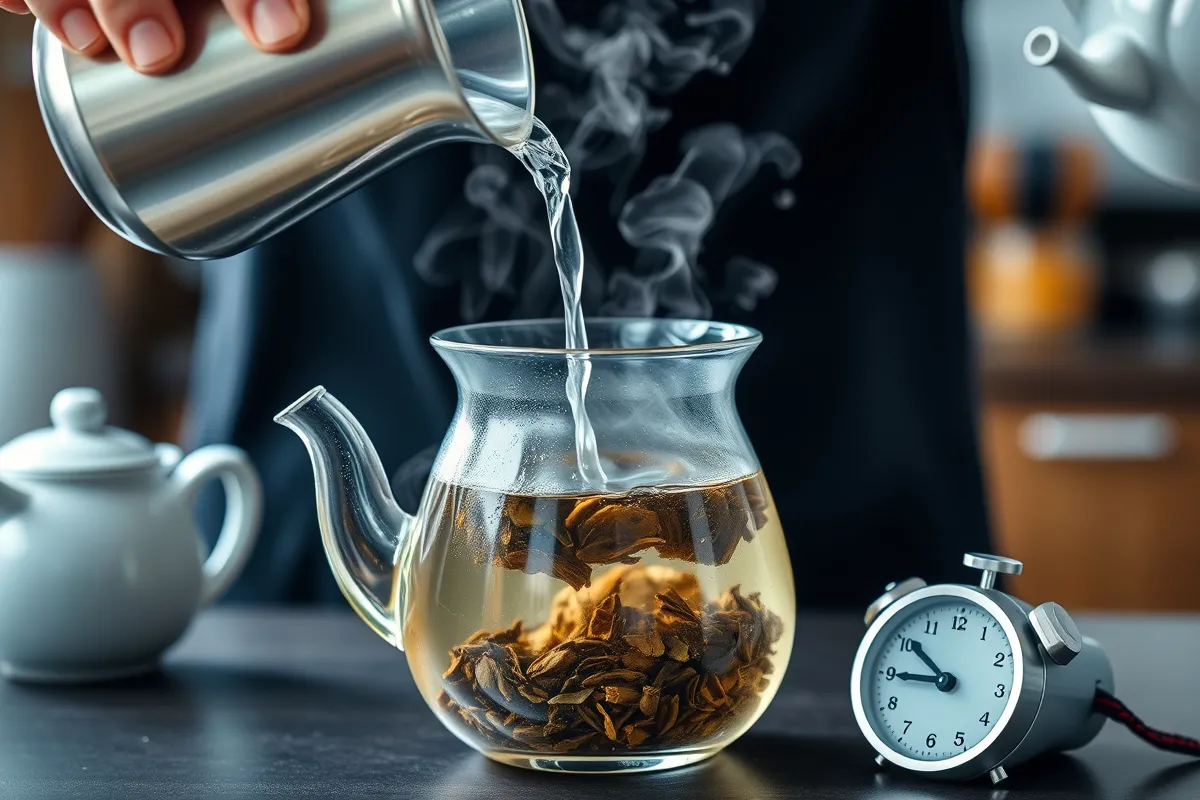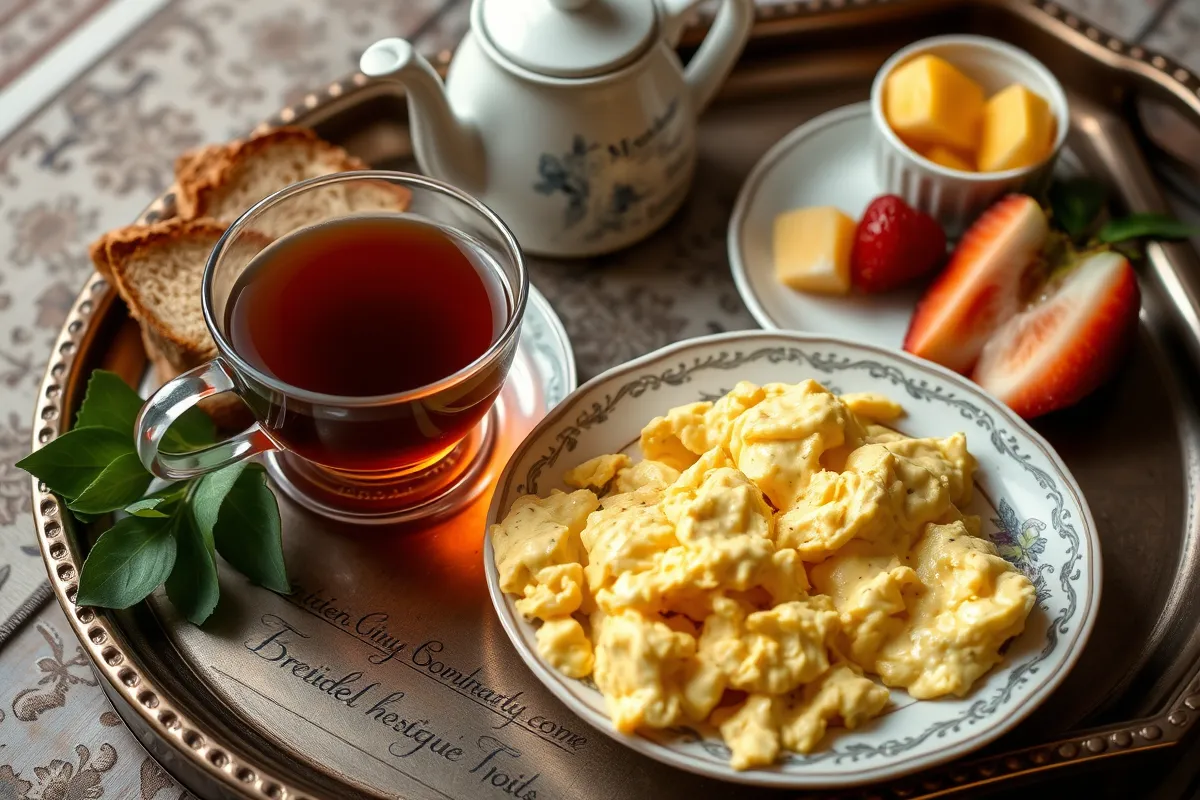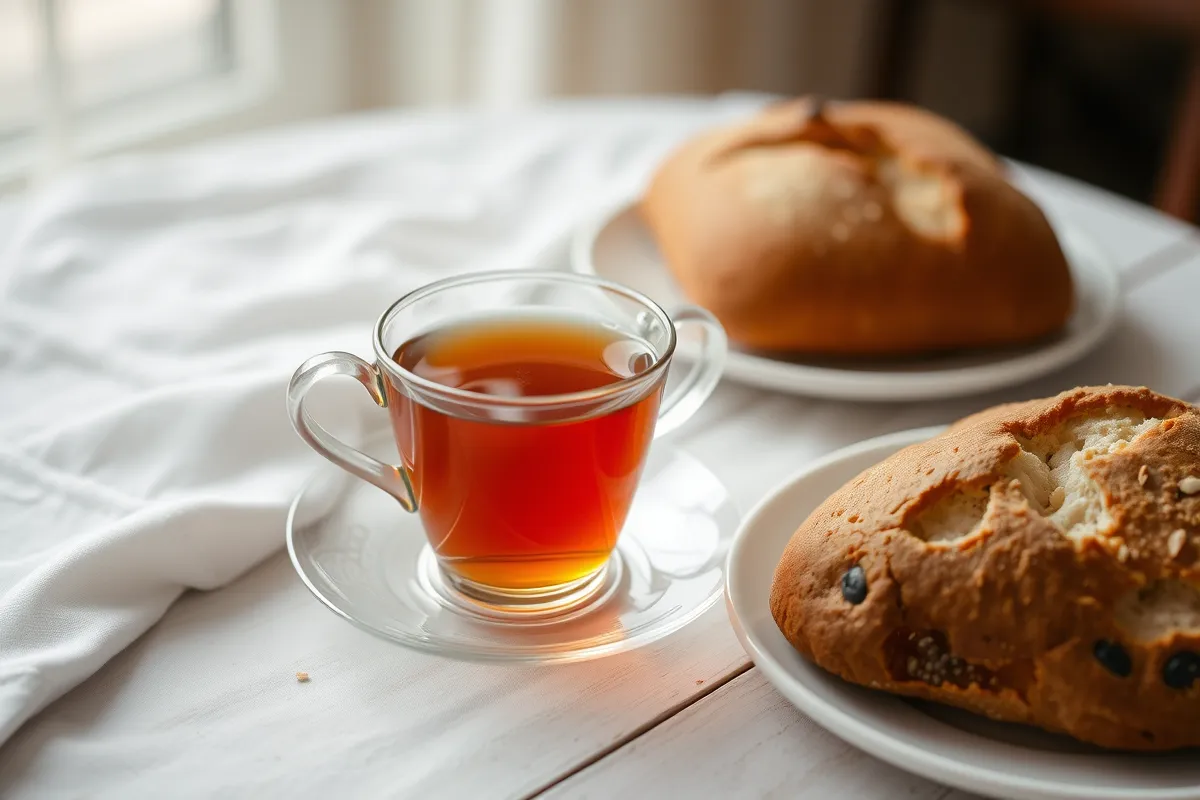Introduction
English Breakfast Tea, a timeless black tea blend, has captured the hearts of tea lovers worldwide. Known for its robust flavor and ability to pair seamlessly with various meals, this tea holds a rich history and cultural significance. From its origins in the 19th century to its place in modern tea culture, he is more than just a morning beverage—it’s an experience. This guide will take you through every facet of English Breakfast Tea, from its origins to brewing tips and perfect food pairings.
Understanding English Breakfast Tea
Definition and Overview
English Breakfast Tea is a bold and full-bodied black tea blend that typically includes Assam, Ceylon, and Kenyan teas. It’s loved for its rich flavor and high caffeine content, making it an ideal choice for starting the day. While commonly enjoyed with milk and sugar, its robust profile also shines on its own. Despite its name, this tea is not limited to breakfast; its versatility extends to any time of day.
This classic tea blend stands out due to its smooth yet invigorating taste, offering subtle hints of malty, citrusy, and earthy notes. With every sip, you get a sense of tradition, making it a staple in tea culture worldwide. Whether you prefer it hot or iced, English Breakfast Tea delivers a comforting and energizing experience.
Historical Origins of English Breakfast Tea
Early Beginnings in the 19th Century
The history this Tea can be traced back to the early 1800s. Legend has it that the blend was crafted to suit the hearty breakfasts of the time, which included eggs, bread, and meats. Its popularity soared in England and beyond, as its bold flavor complemented the rich foods of a traditional English breakfast.
One popular story credits Scottish tea merchant Robert Drysdale for popularizing the blend, though the exact origins remain debated. During this era, tea was considered a luxury, but the accessibility of black tea blends like English Breakfast Tea marked a shift in tea-drinking culture.
Evolution Over Time
Over the decades, the recipe evolved, incorporating different teas from regions like Sri Lanka and Kenya to create its signature robust flavor. As tea-drinking became a global tradition, the blend gained fans in countries like the United States, where it was associated with elegance and refinement.
English Breakfast Tea’s adaptability also helped solidify its reputation. From its role in traditional British tea time to its influence on modern tea practices, this blend is celebrated for bridging history and culture.
Composition and Characteristics
Blend Components
The composition of English Breakfast Tea is what makes it truly unique. This iconic blend brings together the boldness of Assam, the brightness of Ceylon, and the smoothness of Kenyan teas. Each tea adds its own distinctive flavor and character, resulting in a harmonious and robust profile that has captivated tea enthusiasts worldwide.
Assam Tea
Grown in the lush plains of Assam, India, Assam tea is known for its rich, malty flavor and dark amber hue. This tea forms the backbone of many English Breakfast blends, providing a strong and full-bodied base. Its high caffeine content contributes to the invigorating quality of the blend, making it a perfect choice for those early morning pick-me-ups.
Additionally, Assam tea’s distinct malty sweetness pairs beautifully with milk and sugar, enhancing the overall drinking experience. Its smooth texture and deep flavor ensure that every sip is satisfying and balanced.
Ceylon Tea
Sri Lanka’s Ceylon tea brings a bright and citrusy character to the blend. Its brisk flavor and refreshing aroma add complexity, balancing the boldness of Assam tea. With hints of lemon and astringency, Ceylon tea enhances the overall crispness of English Breakfast Tea, making it lively and delightful.
Interestingly, the production process of Ceylon tea involves meticulous hand-picking and oxidation, which amplify its nuanced flavor. Its versatility ensures that it remains a staple in black tea blends worldwide.
Kenyan Tea
Kenyan tea, often underrated, lends a distinctive depth and smoothness to English Breakfast Tea. Known for its bold taste and coppery red color, it complements the other components beautifully. Grown in high-altitude regions, Kenyan tea is celebrated for its consistent quality and robust flavor.
Flavor Profile
Aroma and Taste Notes
The flavor profile this Tea is one of its most defining characteristics. Its aroma combines malty, floral, and slightly citrusy notes, creating a tantalizing sensory experience. The taste is bold and full-bodied, with a delicate balance of sweetness and astringency.
Whether you enjoy it plain or with milk, the complex flavors of English Breakfast Tea never fail to impress. The interplay of maltiness, brightness, and a slight earthiness ensures that every sip is as enjoyable as the first.
Caffeine Content
Another standout feature of English Breakfast Tea is its caffeine content. A typical cup contains around 40-70 milligrams of caffeine, providing a gentle energy boost without the jitters associated with coffee. This moderate level of caffeine makes it an ideal morning beverage for those seeking sustained alertness.
Moreover, the caffeine in black tea is often accompanied by L-theanine, an amino acid that promotes calmness and focus. This unique combination of stimulation and relaxation makes thisTea a beloved choice for both work and leisure.
Cultural Significance
Role in British Culture
English Breakfast Tea holds a revered place in British culture, symbolizing tradition, hospitality, and comfort. It is a staple in British households, often enjoyed with milk and sugar to complement hearty meals or provide warmth on a chilly afternoon.
Association with the Full English Breakfast
The name “English Breakfast Tea” reflects its role as a companion to the iconic Full English Breakfast, which typically includes eggs, sausages, and toast. Its robust flavor cuts through the richness of these foods, creating a harmonious balance that enhances the meal.
Beyond breakfast, this tea has become synonymous with British culinary identity, reinforcing its role as a cultural touchstone. The association extends to tea rituals and gatherings, further solidifying its importance in British life.
Influence on Global Tea Practices
English Breakfast Tea influences British culture and leaves a significant mark on global tea practices. Its popularity spreads to the United States, Asia, and beyond, where people celebrate it as a versatile and approachable black tea blend.
Today, people enjoy English Breakfast Tea in various forms—hot, iced, or as a base for creative tea lattes. Its global appeal highlights its adaptability and timeless charm.
Health Benefits and Considerations
Antioxidant Properties
English Breakfast Tea is rich in antioxidants, particularly polyphenols, which are known to combat oxidative stress in the body. These compounds help neutralize free radicals, reducing the risk of chronic diseases such as cancer and promoting overall cellular health.
The antioxidants in black tea, including theaflavins and thearubigins, also support skin health by protecting against UV damage and premature aging. A daily cup of English Breakfast Tea can be a delicious way to boost your body’s defenses naturally.
Impact on Heart Health
Consuming English Breakfast Tea regularly may benefit heart health. Studies suggest that black tea can help reduce LDL (“bad”) cholesterol levels while improving HDL (“good”) cholesterol levels. This contributes to better circulation and a lower risk of cardiovascular diseases.
Furthermore, black tea contains flavonoids that may improve blood vessel function, supporting healthy blood pressure. Including English Breakfast Tea in your diet can complement a heart-healthy lifestyle.
Potential Side Effects
While English Breakfast Tea offers numerous benefits, it’s essential to consume it in moderation. Excessive intake may lead to side effects such as caffeine sensitivity, which can cause insomnia or jitteriness. Additionally, black tea contains tannins that may interfere with iron absorption in some individuals.
To minimize these risks, enjoy your tea alongside meals or snacks and avoid over-brewing, which can increase tannin content. English Breakfast Tea remains a safe and delightful beverage for most when consumed responsibly.
Brewing the Perfect Cup

Traditional Brewing Methods
Mastering the art of brewing English Tea ensures a flavorful and satisfying experience. This traditional method involves precision, patience, and attention to detail, creating a perfectly balanced cup every time.
Selecting Quality Tea Leaves
The foundation of a good cup of tea lies in the quality of the leaves. Opt for loose-leaf tea rather than tea bags whenever possible, as it often delivers a more robust and nuanced flavor. Look for leaves that are dark, uniform, and free from dust or debris.
To achieve the best results, store your tea in an airtight container, away from light, heat, and moisture. This practice preserves the tea’s natural oils and aromatic compounds, ensuring every cup bursts with fresh flavor.
Water Temperature and Steeping Time
Water quality and temperature play pivotal roles in brewing. Use fresh, filtered water heated to 90–95°C (194–203°F). Over-boiling can strip the water of oxygen, leading to a flat-tasting tea.
For steeping, measure one teaspoon of tea leaves per cup, then pour the hot water over them. Allow the tea to steep for 3–5 minutes, depending on your taste preference. Over-steeping can result in bitterness, while under-steeping may produce a weaker brew.
Modern Variations
With its versatility, adapts beautifully to modern trends and preferences, adding a contemporary twist to a classic favorite.
Iced English Breakfast Tea
Perfect for warmer months, iced Tea is a refreshing take on the traditional brew. Begin by brewing a strong batch of tea using double the usual amount of leaves. Let it cool, then pour it over ice and add a slice of lemon or a splash of simple syrup for a zesty, invigorating drink.
This variation maintains the boldness of the tea while introducing a chilled and crisp flavor profile, making it a delightful alternative for tea enthusiasts.
Incorporating Milk and Sweeteners
One of the most popular ways to enjoy English Breakfast Tea is with milk and sweeteners. Add a splash of steamed or cold milk to the brewed tea for a creamy texture and mellow taste. Natural sweeteners like honey or agave syrup enhance the tea’s inherent sweetness without overpowering its flavor.
Experiment with ratios to find your perfect balance, whether you prefer a traditional British-style cup or a modern latte-inspired twist.
Pairing English Breakfast Tea with Food

Ideal Breakfast Pairings
As its name suggests, English Breakfast Tea is an excellent companion for morning meals. Its robust and malty flavor pairs wonderfully with hearty dishes such as scrambled eggs, buttered toast, or pancakes. The tea’s astringency cuts through the richness of these foods, creating a balanced and satisfying dining experience.
For lighter options, consider pairing it with fresh fruits or yogurt. The tea’s brightness complements the natural sweetness of fruits, making it a versatile choice for any breakfast spread.
Afternoon Tea Accompaniments
English Breakfast Tea isn’t limited to mornings; it shines just as brightly during afternoon tea. Pair it with scones, clotted cream, and jam for a quintessentially British experience. The tea’s boldness balances the sweetness of baked goods, ensuring every bite is complemented by every sip.
Sandwiches, especially cucumber or egg salad varieties, are also great accompaniments. They provide a savory contrast to the tea’s strong and slightly sweet profile, making it a delightful choice for any occasion.
Popular Brands and Varieties
Notable English Breakfast Tea Brands
Several renowned brands offer exceptional Tea. Among them, Twinings, Yorkshire Tea, and Harney & Sons stand out for their consistent quality and rich flavors. Each brand offers its own interpretation of the classic blend, allowing tea lovers to explore a range of options.
These brands often provide both loose-leaf and bagged options, catering to diverse preferences and lifestyles. Whether you seek a bold brew or a more delicate cup, these trusted names have something to offer.
Organic and Fair-Trade Options
For those who prioritize sustainability, organic and fair-trade English Tea varieties are widely available. Brands like Numi and Pukka focus on ethical sourcing and environmentally friendly practices, ensuring that every cup supports farmers and ecosystems.
These options often feature teas grown without pesticides or chemicals, delivering a cleaner and more natural flavor. Choosing organic and fair-trade teas aligns your tea-drinking habits with a commitment to social and environmental responsibility.
Frequently Asked Questions of English Breakfast Tea
What distinguishes English Breakfast Tea from other black teas?
English Breakfast Tea is a blend of robust black teas like Assam, Ceylon, and Kenyan teas, known for its full-bodied flavor and versatility.
Can English Breakfast Tea be enjoyed without milk?
Absolutely! Its bold flavor makes it enjoyable on its own, though many appreciate adding milk for a smoother taste.
How much caffeine is in English Breakfast Tea?
A typical cup contains 40–70 milligrams of caffeine, making it a great alternative to coffee for a morning energy boost.
Are there decaffeinated versions available?
Yes, many brands offer decaffeinated English Breakfast Tea, allowing you to enjoy its flavor without the caffeine.
What is the best way to store English Breakfast Tea?
Store it in an airtight container, away from light, heat, and moisture, to preserve its freshness and flavor.
Does English Breakfast Tea have any health benefits?
Yes, it is rich in antioxidants that promote heart health, reduce stress, and support overall well-being.
Summarizing the Essence of English Breakfast Tea
Is more than just a beverage; it’s a tradition steeped in history, flavor, and cultural significance. From its carefully crafted blend of Assam, Ceylon, and Kenyan teas to its role in British culture and beyond, this iconic tea continues to delight and inspire. Whether you prefer it with milk and sugar, paired with breakfast, or enjoyed as a modern iced variation, every sip of English Breakfast Tea offers a comforting and invigorating experience.

